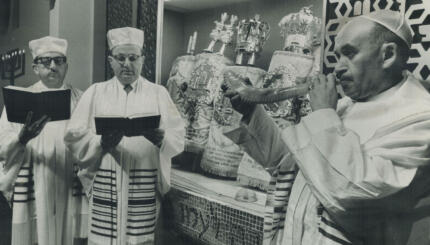The prayer of Unetaneh Tokef is climaxed by the culminating verse, which the congregation proclaims as one: “Penitence, prayer, and righteous acts avert the severe decree.”
In some of the older Mahzors [holiday prayer books], there appear three other words, above “teshuvah, tefillah, tzedakah,” [repentance, prayer and righteous acts]in a smaller print: “tzom, kol, mamon“– fasting, voice, money. These represent the means or methods whereby one can practice the three virtues of penitence, prayer, and righteousness. For the ordeal of fasting leads to repentance; the voice is the medium of soul-stirring prayer; and the contribution of money to a worthy cause represents an act of “tzedakah.”
If we analyze “tzom, kol, mamon“even further, we discover, as many commentators point out, that the gematria or numerical equivalent of each of the three words is the same. The sum total in each case is equal to 136. This remarkable fact is one way of teaching us that “teshuvah, tefillah, tzedakah”are all interrelated, that penitence, prayer, and righteous deeds are all aspects of the same ideal of living a good and Godly life. Also, it’s interesting to note that 136 is twice 68, which happens to be the number value of “chayim,” life. This means that we are thus blessed with a “double life,” both in the physical and spiritual sense.
To go one step further, repentance implies returning to the ways of Torah; prayer means turning to God through Avodah or divine worship; and tzedakah means the carrying out of deeds of loving kindness by gemilut chasadim benevolent acts. This is reminiscent of the familiar passage in the first chapter of Pirkei Avot: The world is based upon three principles: Torah, worship, and kindliness” (Simon the Just).
With your help, My Jewish Learning can provide endless opportunities for learning, connection and discovery.
Reprinted with permission from Moments of Transcendence: Inspirational Readings for Yom Kippur, edited by Rabbi Dov Peretz Elkins (Jason Aronson).
Rosh Hashanah
Pronounced: roshe hah-SHAH-nah, also roshe ha-shah-NAH, Origin: Hebrew, the Jewish new year.
Yom Kippur
Pronounced: yohm KIPP-er, also yohm kee-PORE, Origin: Hebrew, The Day of Atonement, the holiest day on the Jewish calendar and, with Rosh Hashanah, one of the High Holidays.
Mahzor
Pronounced: MAKH-zore, Origin: Hebrew, literally “cycle” the mahzor is the special prayer book for the High Holidays, containing all the liturgy for Rosh Hashanah and Yom Kippur.
teshuvah
Pronounced: tuh-SHOO-vah, (oo as in boot) Origin: Hebrew, literally “return”, referring to the “return to God” teshuvah is often translated as “repentance.” It is one of the most significant themes and spiritual components of the High Holidays.
tefillah
Pronounced: tuh-FEEL-uh or tuh-fee-LAH, Origin: Hebrew, prayer.


